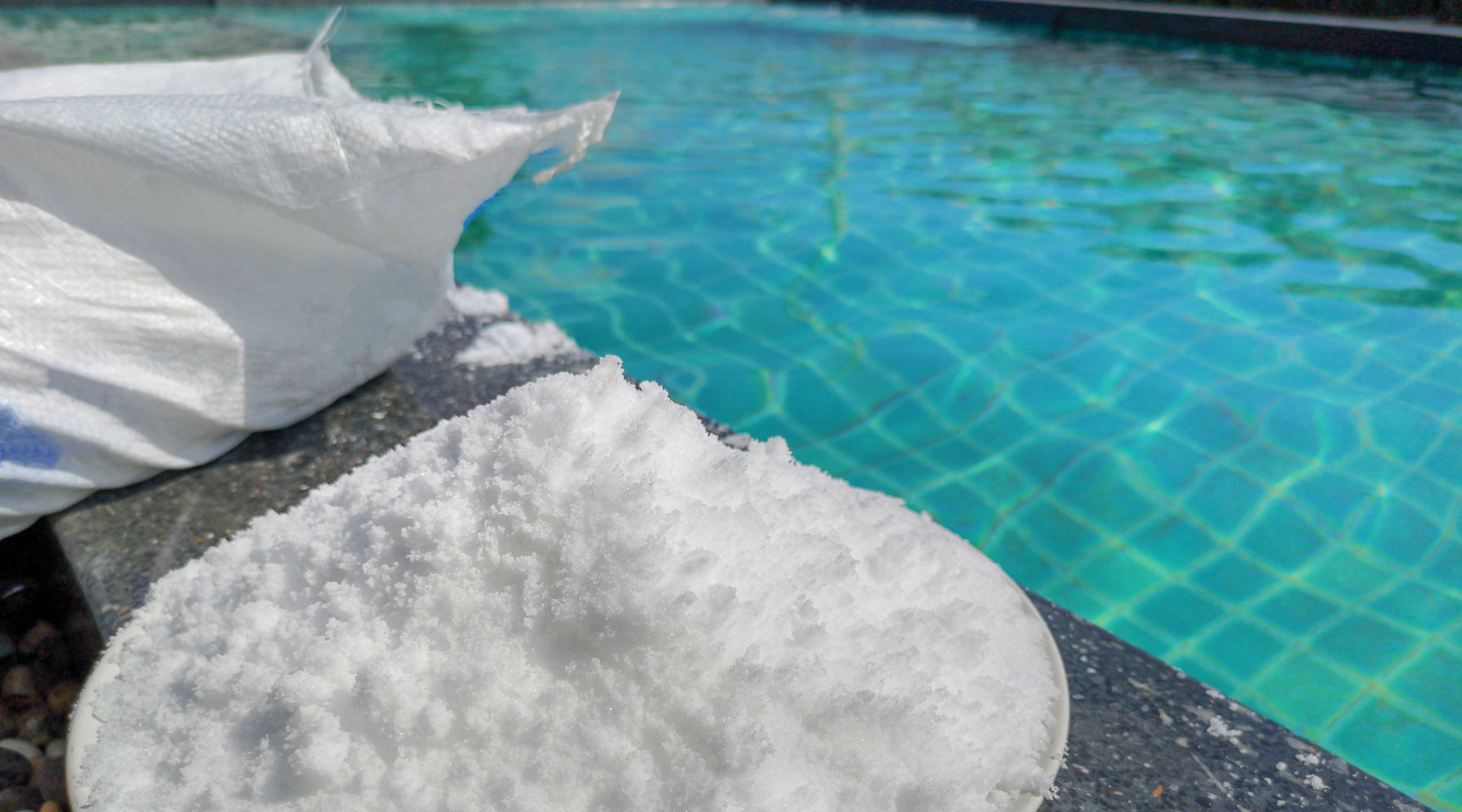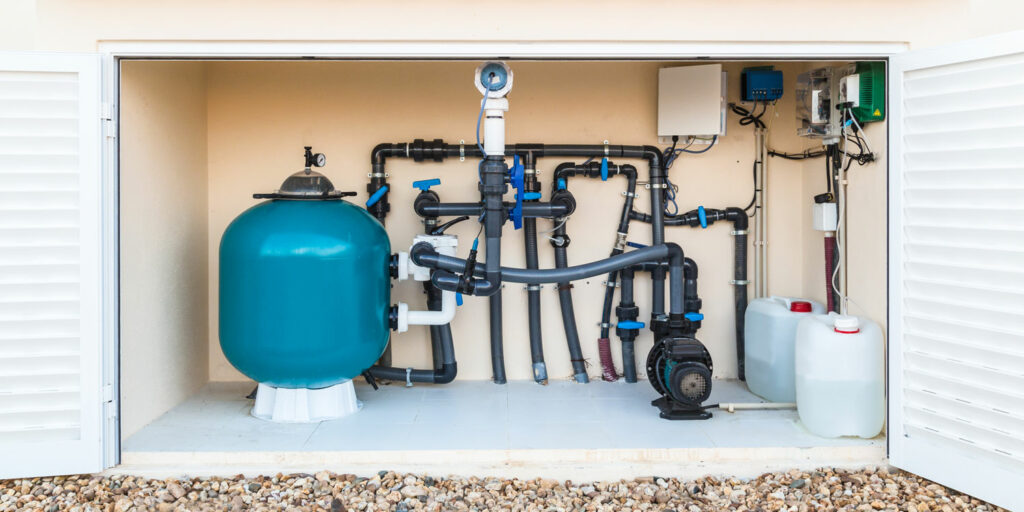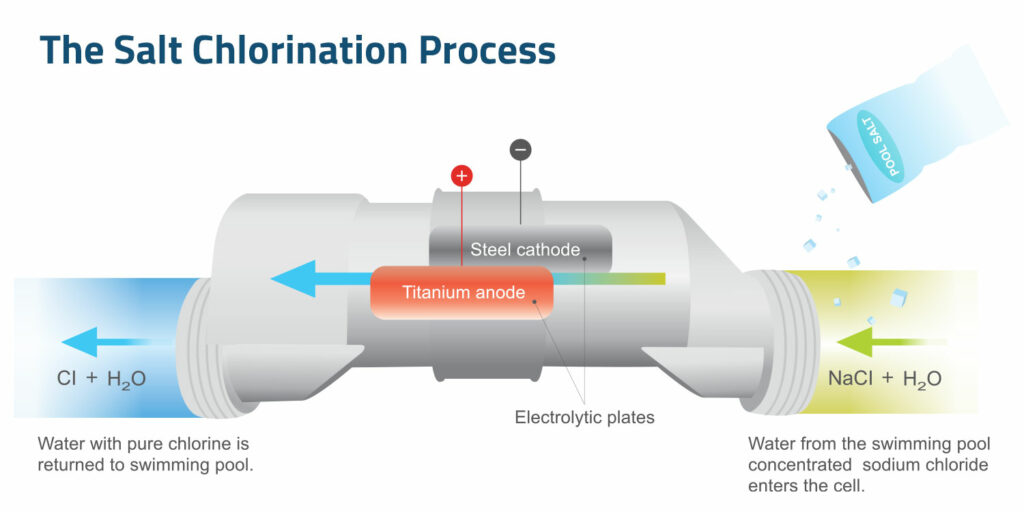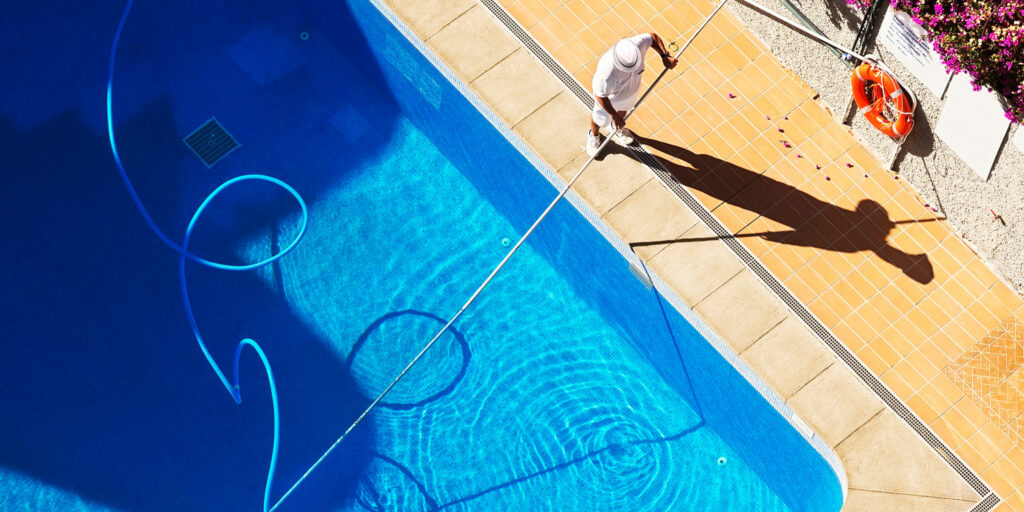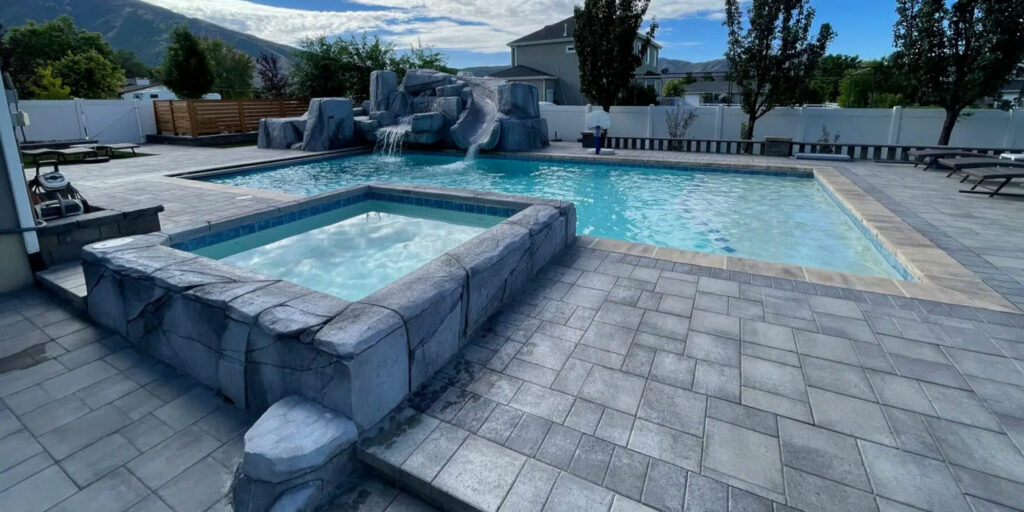As trusted custom pool builders, Stevenson Brothers Custom Pools is passionate about creating beautiful and functional swimming pools for our clients. That passion means we have the answers to your swimming pool questions. One question we hear often is,
“How does a saltwater swimming pool work?”
This post explains how salt water swimming pools work, their components, benefits, and practical maintenance tips to ensure your saltwater pool stays clean and healthy.
What is a Salt Water Swimming Pool?
Swimming pools have been a popular feature in homes for decades, providing a source of enjoyment and relaxation for families and friends. However, traditional chlorine pools have challenges, including the strong smell and harsh chemicals often associated with chlorine.
A salt water swimming pool uses a salt chlorine generator to produce chlorine from salt. This process eliminates the need for regular chlorine maintenance and helps to maintain clean and clear pool water. Salt water pools offer a gentler alternative to traditional chlorine pools, with many benefits for pool owners and the environment. This makes them popular with families and individuals looking for a more natural swimming experience.
Components of a Salt Water Swimming Pool
The key components of a saltwater swimming pool include the salt chlorine generator, filtration system, and salt cell. These components work together to keep the pool water clean and free of harmful bacteria, algae, and other contaminants.
Salt Chlorine Generator
The salt water swimming pool’s salt chlorine generator uses electrolysis to convert the salt in the pool water into chlorine. This eliminates the need for manual chlorine addition and helps maintain a consistent chlorine level.
Salt Water Filtration System
As with traditional chlorine pools, saltwater pools still need a robust filtration system to keep the water clean and clear. You can use different filters, such as sand, cartridge, or diatomaceous earth filters, to remove debris and particles from the water in salt water pools. Regular cleaning and maintenance of the filtration system will help ensure optimal performance.
Salt Cell
The salt cell plays a crucial role in electrolysis, converting salt into chlorine. The salt cell requires regular maintenance, including cleaning and inspection, to ensure the efficient operation of the salt chlorine generator.
The Salt Chlorination Process
Electrolysis
The salt chlorination process in a saltwater pool begins with electrolysis. An electrical current passes through the salt water inside the salt chlorine generator during the electrolysis process. This current causes the salt (sodium chloride) to break down into its basic components—chlorine gas and sodium hydroxide.
Diffusion
The chlorine gas produced during electrolysis dissolves into the water to form hypochlorous acid. This acid diffuses and circulates into the pool water. as a sanitizer, killing bacteria and other contaminants.
Benefits of Salt Water Pools
-
Convenience
Since the chlorine comes from electrolysis, you can adjust your chlorine levels by changing a setting on your salt chlorine generator. Many salt chlorine generators come with automation features that make it easy to monitor and adjust chlorine levels as needed. This helps ensure that the water remains consistently clean and safe for swimmers.
-
Reduced Use of Chemicals
One of the main benefits of salt water pools is the reduced use of chemicals in a salt vs chlorine pool. Saltwater pools require less chlorine and other harsh chemicals to maintain water quality. This can lead to softer, more natural-feeling water.
-
Health Benefits
The gentler water can make swimming in saltwater pools more enjoyable for everyone, especially those with sensitive skin or allergies. With fewer chemicals in salt water pools, swimmers reduce the risk of skin and eye irritation and respiratory issues triggered by chlorine or its fumes.
-
Environmental Advantages
Salt water pools also have environmental advantages. By using fewer chemicals, salt water pools can have a lower impact on the environment and reduce the amount of harmful chemicals released into the ecosystem.
Salt Water Pool Maintenance and Care
-
Regular Testing
Regularly test, monitor, and adjust salt and chlorine levels to maintain a healthy saltwater pool. By monitoring these levels, you keep the water properly sanitized and safe for swimmers. Test your pool water at least once a week to ensure optimal water quality. You can get salt water pool testing kits to make this process quick and easy for pool owners.
-
Cleaning
Regularly skim and clean the pool to remove debris and prevent algae growth. Keeping the pool clean can maintain water clarity and avoid contamination.
-
Balancing
Balance the pH levels in a salt water pool to ensure water quality. Imbalanced pH levels can lead to corrosion of pool equipment and discomfort for swimmers. Regularly testing and adjusting pH levels will help keep the water balanced and safe.
Common Misconceptions
Despite the growing popularity of saltwater swimming pools, several common misconceptions persist.
Damages Equipment – False
One prevalent misconception is that saltwater pools harm pool equipment due to salt corrosion. In reality, properly maintained salt water pools have a salt concentration equivalent to that of a teardrop and pose no significant risk of corrosion.
Expensive – False
Another misconception is that saltwater pools are more expensive to maintain than traditional chlorine pools. While the initial installation cost of a salt-chlorine generator may be higher, the long-term maintenance costs are generally lower. Salt water pools require less frequent chemical adjustments and use fewer harsh chemicals, resulting in savings over time.
Low Water Quality – False
There is also a misconception that salt water pools have lower water quality than traditional chlorine pools. Saltwater pools often have clearer, softer, and more natural-feeling water due to fewer chemicals.
Hazardous – False
Additionally, some people believe salt water pools are unsuitable for people with sensitive skin or allergies. On the contrary, the gentle water in salt water pools can benefit those with sensitive skin, reducing the risk of irritation and allergic reactions commonly associated with traditional chlorine pools.
Saltwater pools are safe and simple to maintain, with many benefits over traditional chlorine pools.
Utah’s Custom Salt Water Pool Builder
Contact Stevenson Brothers Custom Pools whenever you need Utah Custom Swimming Pool Builder & Contractor services.
Get a free estimate on a custom salt water pool in Salt Lake City or Northern Utah. Contact Stevenson Brothers Custom Pools today. Our team can help you create the pool of your dreams and enjoy all the benefits of salt water pool ownership.
Additional Resources
We are also your go-to custom pool with waterfalls builder. View examples of our work and gather inspiration for your project.



